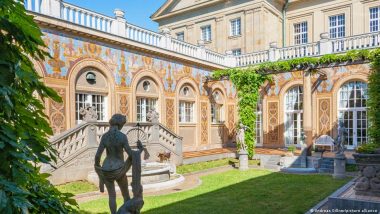Ah, la dolce vita. Sunshine, Mediterranean food — and a German spa town? This DWFC episode features Manfred Honeck conducting the Bamberg Symphony and cellist Maximilian Hornung performing passionate, energetic works."La Dolce Vita" was the motto of the Italian-themed 2023 Kissinger Summer music festival, and it was a concert season filled with passion, energy and musical fireworks.
Also Read | Business News | Nexteer Achieves Global Production Milestone of 100 Million Electric Power Steering Systems.
Bad Kissingen: A spa town
Also Read | India News | Of 650 HC Judges Appointed Since 2018, Nearly 17 Pc Belong to SC, ST, OBC Categories: Govt.
The festival is named for the small Bavarian spa town where it's held, Bad Kissingen, which has mineral spring baths dating back to Roman times. In the 18th and 19th centuries, it became a fashionable vacation destination for prominent Europeans: German emperors, Russian royals, famous artists, old and new money families — strolling in the spa gardens was like taking in a who's who of the continent.
In 2021, Bad Kissingen was added to UNESCO's "Great Spa Towns of Europe" list. One of its sister spa towns is Monte Cantini Therme in Tuscany, which was frequented by Italian composers like Verdi and Leoncavallo. The relationship between the two towns helped inspire the festival's 2023 Italian theme.
But the inspiration also came from the Italian composer Gioachino Rossini's visit to Bad Kissingen. Festival director Alexander Steinbeis shares the rather amusing story:
"In 1856, Gioachino Rossini was in Bad Kissingen for several weeks — he actually suffered from gonorrhea, and his doctor advised him to go to Bad Kissingen to get treated here. He got so much better that at the end of his stay, he actually started composing again. And I think it's quite an interesting and also a funny story — the fact that he was here ... that essentially was one of the impulses to come up with this Italian theme."
A beautiful place to hear a cello concerto
In addition to its thermal baths, Bad Kissingen is famous for another reason: It's home to the "Regentenbau," or "regent's building," a stunningly beautiful and acoustically impressive concert hall. The neo-Baroque building was inaugurated in 1913, allowing guests to enjoy musical entertainment after a long day at the spa.
The Regentenbau has multiple concert spaces. The main one is named for the building's architect, Max Littmann. It's a long square hall that is completely covered in cherry wood paneling. The richly toned, warm space is a beautiful place to listen to a concert.
"The audience is very close, and the wood is always breathing," conductor Manfre Honeck explains. "We mustn't forget that string instruments are made of wood. This creates a certain type of intimacy with the audience. I love this feeling. And everything just sounds very, very good here."
A string instrument features in one of the works in this episode's program: Joseph Haydn's Cello Concerto No. 2 in D Major. Despite its being some 300 years old, it has finesse, elegance, humor. Cellist Maximilian Hornung, who is the soloist, also finds Haydn's style "incredibly humorous" and "bubble[ing] over with youth."
Schubert's secret symphony
Another piece on the program has a surprising story behind it: It's Franz Schubert's Symphony No. 9 in C major, also called "The Great" symphony. Perhaps you know that it is one of the most important symphonies in music history. But did you know that it was only discovered by chance?
In 1838, roughly 10 years after Schubert had died, composer Robert Schumann was visiting his brother Ferdinand in Vienna, where he happened to stumble across a totally unknown Schubert score, causing him to more or less flip out. "You should have been here!" he wrote to his wife, Clara. "These are human voices! Everything is singing!" Schumann naturally held onto this musical treasure and took it with him to Leipzig. The symphony was premiered there in March 1839, with Felix Mendelssohn conducting Leipzig's Gewandhaus Orchestra. At the Kissinger Summer music festival it was performed by Manfred Honeck and the Bamberg Symphony.
We hope you enjoyed the works in today's show, which was hosted by Cristina Burack. Thanks to sound engineer Thomas Schmidt and producer Anastassia Boutsko, and thanks to all of you for listening. If you have any feedback, drop us a line at music@dw.com.
Performances in this episode:
1. Gioachino Rossini
Overture to "La gazza ladra"
Bamberg Symphony
Manfred Honeck, conductor
2. Joseph Haydn
Cello Concerto No. 2 in D major, Hob. VIIb/2, Op. 101
Maximilian Hornung, cello
Bamberg Symphony
Manfred Honeck, conductor
3. Johann Sebastian Bach
"Prelude" from Bach's Cello Suite No. 1 in G major, BWV 1007
Maximilian Hornung, cello
Franz Schubert
Allegro vivace (movement I) from Piano Quintet in A major ("Trout Quintet"), Op. 114, D667
Maximilian Hornung, cello
Anne-Sophie Mutter, violin
Daniil Trifonov, piano
Hwayoon Lee, viola
Roman Patkoló, bass
4. Franz Schubert
Symphony No. 9 in C major ("The Great"), D 944
Bamberg Symphony
Manfred Honeck, conductor
5. Joseph Haydn
Andante cantabile (movement II) of String Quartet in F major, op. 3. No. 5
Bamberg Symphony
Manfred Honeck, conductor
6. Franz Schubert
"Ständchen" (No. 4) from "Schwangengesang," D 957 (arr. for piano and violin)
Anne-Sophie Mutter, violin
Daniil Trifonov, piano
(The above story first appeared on LatestLY on Dec 14, 2023 08:10 PM IST. For more news and updates on politics, world, sports, entertainment and lifestyle, log on to our website latestly.com).













 Quickly
Quickly





















